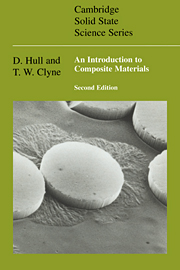Book contents
- Frontmatter
- Contents
- From the preface to First Edition
- Preface to Second Edition
- 1 General introduction
- 2 Fibres and matrices
- 3 Fibre architecture
- 4 Elastic deformation of long-fibre composites
- 5 Elastic deformation of laminates
- 6 Stresses and strains in short-fibre composites
- 7 The interface region
- 8 Strength of composites
- 9 Toughness of composites
- 10 Thermal behaviour of composites
- 11 Fabrication
- 12 Applications
- Appendix: Nomenclature
- Author index
- Subject index
5 - Elastic deformation of laminates
Published online by Cambridge University Press: 05 June 2012
- Frontmatter
- Contents
- From the preface to First Edition
- Preface to Second Edition
- 1 General introduction
- 2 Fibres and matrices
- 3 Fibre architecture
- 4 Elastic deformation of long-fibre composites
- 5 Elastic deformation of laminates
- 6 Stresses and strains in short-fibre composites
- 7 The interface region
- 8 Strength of composites
- 9 Toughness of composites
- 10 Thermal behaviour of composites
- 11 Fabrication
- 12 Applications
- Appendix: Nomenclature
- Author index
- Subject index
Summary
In the last chapter, it was shown that an aligned composite is stiff along the fibre axis, but relatively compliant in the transverse directions. Sometimes, this is all that is required. For example, in a slender beam, such as a fishing rod, the loading is often predominantly axial and transverse or shear stiffness are not important. However, there are many applications in which loading is distributed within a plane: these range from panels of various types to cylindrical pressure vessels. Equal stiffness in all directions within a plane can be produced using a planar random assembly of fibres. This is the basis of chopped-strand mat. However, demanding applications require material with higher fibre volume fractions than can readily be achieved in a planar random array. The approach adopted is to stack and bond together a sequence of thin ‘plies’ or ‘laminae’, each composed of long fibres aligned in a single direction, into a laminate. It is important to be able to predict how such a construction responds to an applied load. In this chapter, attention is concentrated on the stress distributions which are created and the elastic deformations which result. This involves consideration of how a single lamina will deform on loading at an arbitrary angle to the fibre direction. A brief summary is given first of some matrix algebra used in elasticity theory.
Elastic deformation of anisotropic materials
Hooke's law
A review of some basic points about stress and strain is appropriate.
- Type
- Chapter
- Information
- An Introduction to Composite Materials , pp. 78 - 104Publisher: Cambridge University PressPrint publication year: 1996
- 2
- Cited by

